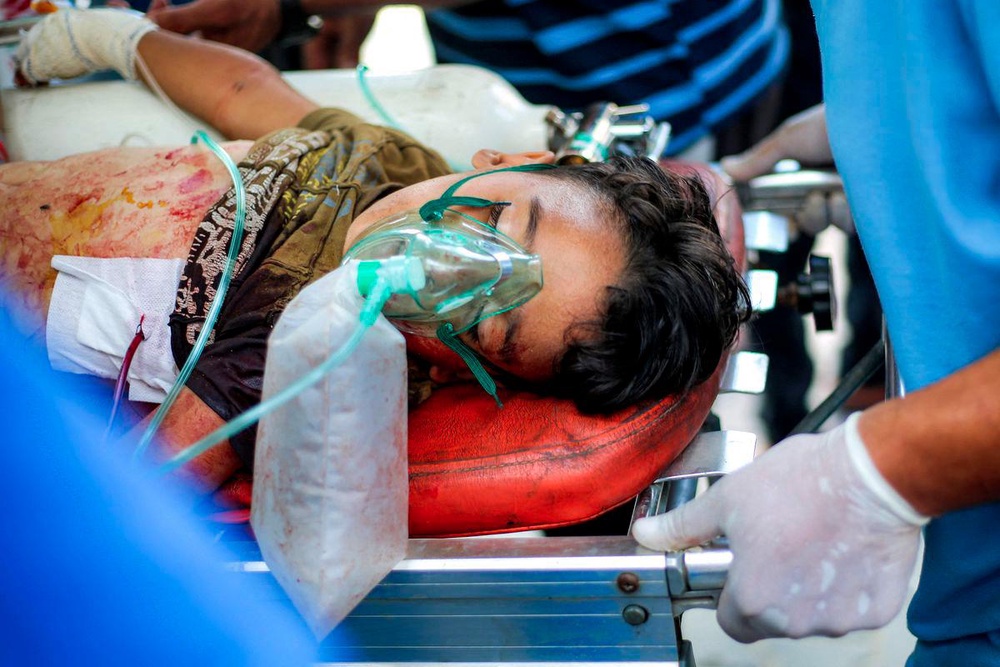Sign up now: Get ST's newsletters delivered to your inbox
More than 100,000 children in Rakhine are suffering from acute malnutrition, with less than 2 per cent able to access treatment.
COX'S BAZAR, Bangladesh - After Ms Ajib Bahar's six-month-old son fell sick in 2024 in Myanmar's war-torn Rakhine state, the 38-year-old Rohingya mother said she had no medicine nor food to give him. The boy died in her arms.
“My children cried all night from hunger. I boiled grass and gave it to them just to keep them quiet,” Ms Bahar said from a refugee camp in Bangladesh's Cox's Bazar, where she and her family sought safety after fleeing violence and starvation in Myanmar.
Rakhine state, a western coastal region that has suffered years of conflict and ethnic violence mostly targeting the Rohingya Muslim minority, is now facing an "alarming" hunger crisis due to a "deadly combination of conflict, blockades, and funding cuts”, according to the United Nations' World Food Programme (WFP).
At a high-level UN conference in New York on Myanmar's minority groups on Sept 30, the United States and Britain announced that they would provide US$96 million (S$124 million) in further assistance to support the Bangladesh refugee camps that house over a million Rohingya who fled Rakhine.
Myanmar has been in crisis since the military seized power in 2021 and brutally cracked down on protests, prompting a nationwide armed uprising and re-igniting a simmering conflict in Rakhine between the junta and a powerful armed group, the Arakan Army.
Five Rohingya, including Ms Bahar and her husband, told Reuters they had survived on leaves, roots and grass in Rakhine before escaping to Bangladesh in the last six months.
More than 100,000 children in Rakhine are suffering from acute malnutrition, with less than 2 per cent able to access treatment, according to previously unreported data provided by aid workers.
They declined to be identified for fear of retribution.
Myanmar's ruling junta has suppressed information about the crisis by pressuring researchers not to collect data about hunger and aid workers not to publish it, Reuters reported in 2024.
Security fears and restrictions by the junta and the Arakan Army mean the UN is unable to move food beyond Sittwe, the junta-controlled state capital, into the central and northern parts of Rakhine, said Mr Michael Dunford, the acting UN head in Myanmar.
"This is obviously contributing to the spike in hunger that we are seeing," said Mr Dunford, who is also the country representative for the WFP. "We're desperately frustrated because we know that there are populations that require our support."
A spokesman for the Arakan Army, Mr Khine Thu Kha, said the junta was blocking the flow of aid, including food and medicine, and that the group was cooperating with the UN and aid agencies.
Its data suggested that one in four children is malnourished, but it had not reached famine levels, he said, blaming the military blockade.
Mr Khine Thu Kha said the conflict made it difficult to provide medical treatment, but the Arakan Army was trying to keep the prices of necessities as low as possible and reduce taxes.
A Myanmar junta spokesman did not respond to a request for comment.
Aid blocked
A combination of conflict, near-empty markets, a stalled economy and blockades is squeezing Rakhine's population like never before, aid workers say.
The situation is particularly dire in camps for tens of thousands of internally displaced people in the state, many of them Rohingya who fled their homes during previous waves of violence and face severe restrictions on their movement.
The data provided by aid workers showed acute malnutrition was widespread in the camps, with parents skipping meals to feed their children.
It also shows that the number of people living in these conditions increased nearly 10- fold between September 2023 and August 2025.
Mr Dunford said he spoke to residents at a Rohingya camp outside Sittwe earlier in 2025.
The agency had supported them before funding cuts forced them to limit food supplies.
"I had one gentleman, in tears, tell me that, 'If WFP can't feed us and the authorities won't support us, then please drop a bomb on us. Put us out of our misery’,” he said.
Rohingya are arriving in Bangladesh in much poorer health than previous waves of refugees, with high rates of malnutrition, particularly among children under the age of five and pregnant and lactating women, said the International Rescue Committee (IRC), a non-profit organisation working in the refugee camps, in September.
The increase in new arrivals coincided with a critical aid funding shortfall worldwide and overstretched health and nutrition services, the IRC said.
"There was hardly any food to eat. Most days, we had only one meal," said Mr Mohammed Idris, Ms Bahar's husband, a farmer from Buthidaung township, adding that he gave his food to the children and ate their leftovers.
Food prices surged and sometimes there was nothing to buy, he said. "I can't remember the last time we ate an egg or meat."
Ms Bahar is now eight months pregnant. Although the family is grateful to be living in peace, conditions in the camp are difficult, she said.
"I wonder – will this child be born hungry too?" REUTERS
[SRC] https://www.straitstimes.com/asia/se-asia/myanmars-war-torn-rakhine-faces-a-hunger-catastrophe-aid-groups-say
 Visit the website
Visit the website







